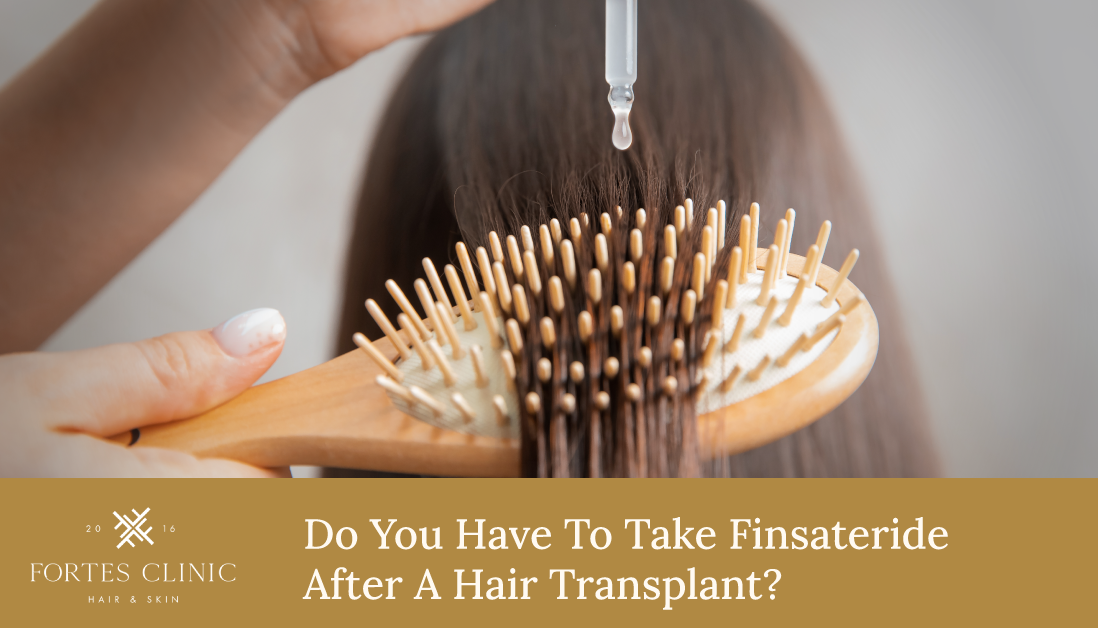Do You Have To Take Finasteride After A Hair Transplant: An Introduction
A common question after surgery is whether finasteride is required. The short answer is no, it is not mandatory. A hair transplant relocates DHT-resistant follicles from the back and sides of the scalp, and those grafts usually keep growing regardless of medication. However, finasteride can help protect your existing, non-transplanted hair, which may still thin over time. Whether you should take it depends on your goals, medical history, and tolerance for medication.
What Finasteride Does After a Transplant
Finasteride blocks the conversion of testosterone to dihydrotestosterone (DHT), a hormone linked with male pattern hair loss. After a transplant, many patients use finasteride to:
- Slow or stabilise thinning in native hair surrounding the transplant
- Reduce the risk of a “halo” of ongoing loss around a strong new hairline
- Support overall density while the result matures
Transplanted grafts are typically DHT-resistant. Finasteride mainly protects the hair you didn’t transplant.
For background on the medicine and how it works, see the NHS overview of finasteride and the BNF prescribing information.
Who Is Most Likely to Benefit
- Men in their 20s to early 40s with active thinning who want to maintain surrounding hair
- Patients with a family history of progressive loss, especially if the crown or mid-scalp is at risk
- Large or multi-area transplants, where protecting native hair helps the overall look
If hair loss is already stable and limited, or if you are sensitive to medications, the balance may be different. This is a personal decision that should be made with a clinician.
Oral vs Topical Finasteride
- Oral finasteride (1 mg daily) is the standard prescription. Evidence for maintaining hair is robust, and benefits continue only while you take it. If stopped, loss generally resumes over months. BNF
- Topical finasteride aims to reduce DHT at the scalp with lower systemic exposure. Some studies suggest it can lower scalp DHT with less effect on blood levels, though products and concentrations vary.
If you wish to read more about the topical option, see the in-depth guide to topical finasteride and the hair loss medication page.
When to Start and For How Long
Plans differ, but common patterns include:
- Starting before surgery to stabilise existing hair, or
- Starting after surgery once early healing is complete
Many patients continue for at least 6 to 12 months to assess benefit, and longer if they wish to maintain results. If you stop, native hair may resume thinning. Transplanted hair should remain, but the contrast between stable grafts and thinning around them can become more noticeable.
Side Effects and Safety
Most people tolerate finasteride well, but side effects can occur. Reported issues include reduced libido, erectile dysfunction, mood changes and, rarely, depressive symptoms. UK and EU regulators advise monitoring for mood-related side effects; recent updates in 2025 reinforced this advice for the 1 mg dose used for hair loss. If you notice mood changes, stop the medicine and seek medical advice.
Finasteride is for adult men with male pattern hair loss. It is not prescribed for women due to pregnancy risks, and it may interact with certain health conditions or medicines. Always discuss personal risks, benefits, and monitoring with a clinician.
What If You Prefer Not to Take Finasteride?
You still have options. A transplant can succeed without medication, and some patients choose non-drug support:
- Minoxidil can help with thickness and is often used alongside or instead of finasteride. See: Does minoxidil work?
- Clinic-based therapies, such as PRP, are sometimes used to support hair quality.
- Density planning through FUE or FUT can be discussed if native hair continues to thin.
The best approach is the one you can follow consistently and safely.
How Finasteride Fits Into the Bigger Picture
Think of finasteride as a maintenance tool around your transplant:
- Protects native hair to keep the overall look balanced
- May reduce visible contrast between stable grafts and areas still prone to thinning
- Is optional and should match your preferences and medical profile
If you are early in your journey, this recovery guide may help: Hair transplant recovery timeline. If you are wondering about hats during healing, see: How long after a hair transplant can I wear a hat?
Frequently Asked Questions
Do I have to take finasteride after a hair transplant?
No. It is optional. Many patients use it to preserve surrounding native hair, but transplanted grafts are typically DHT-resistant.
Will finasteride make my transplant grow faster?
It does not accelerate graft growth. It helps maintain non-transplanted hair, which can improve the overall appearance.
What happens if I stop taking it?
Any maintenance benefit generally fades over months. Transplanted hair remains, but native hair may resume thinning, potentially changing the balance of density.
Is topical finasteride safer?
Some patients choose topical versions to aim for lower systemic exposure. Evidence is growing but products vary; discuss pros and cons with your clinician.
Can I just use minoxidil instead?
Minoxidil is another option. Some people use it alone or together with finasteride. Effectiveness and tolerance vary; a tailored plan is best. BNF
Summary
You do not have to take finasteride after a hair transplant. It is a maintenance option that can help protect native hair and keep results looking balanced as time passes. If you are considering it, weigh potential benefits against side effects, choose oral or topical with professional guidance, and review progress at regular intervals.
If you want tailored advice, send photos or arrange a chat via the contact page.



